Building a deck
0
Overview
Using this Resource
Connecting to the Curriculum
Marking Student Responses
Working with Students
Further Resources
This task is about writing a story.
Now share your story with a friend if you want to.
When you are ready, click on 'Finish' to save your story.
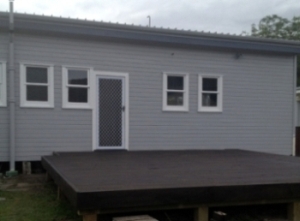
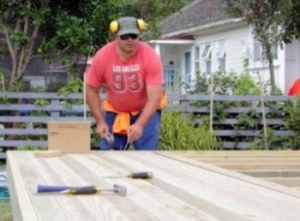
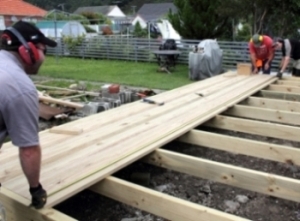
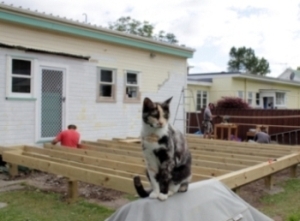
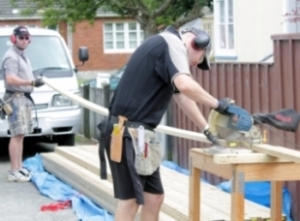




















Task administration:
This task is completed online. It is NOT automarked.
The resource is designed to assess students’ ability to write a simple narrative with a clear sequence of events.
Students put a series of photographs in a self-selected order. They then use the photos as the basis for a narrative (there is no ‘correct’ order). This allows formative assessment of the student’s ability to structure a simple narrative with a beginning (orientation), middle (sequence of events), and ending, using simple connectives to link their ideas. Other possible areas for assessment include sentence structure, punctuation and spelling.
The resource is one of several with the same format. Each resource focuses on a different context. Students can choose the resource that appeals to them, or you might select one to fit in with a class topic.
The resources are suitable for children who can write independently and who have a reasonable level of fluency on a computer or other digital device. For example, it is helpful if students can navigate the keyboard and know how to access basic punctuation such as capital letters and full stops.
The resource has been designed to be used flexibly. It can be completed as a class activity, in groups, in pairs, or individually. You might decide to work through a resource with a whole class as a shared writing activity (for example, on an interactive whiteboard) before children complete their own pieces of writing. This approach will also help those students who find the instructions on each screen difficult to read.
Remind children that they are writing a story based on a series of photographs, but that their reader may not see the photographs. Can they write their story so that it makes sense without the photos?
The resource is designed to assess students’ ability to write a simple narrative with a clear sequence of events.
Students put a series of photographs in a self-selected order. They then use the photos as the basis for a narrative (there is no ‘correct’ order). This allows formative assessment of the student’s ability to structure a simple narrative with a beginning (orientation), middle (sequence of events), and ending, using simple connectives to link their ideas. Other possible areas for assessment include sentence structure, punctuation and spelling.
The resource is one of several with the same format. Each resource focuses on a different context. Students can choose the resource that appeals to them, or you might select one to fit in with a class topic.
The resources are suitable for children who can write independently and who have a reasonable level of fluency on a computer or other digital device. For example, it is helpful if students can navigate the keyboard and know how to access basic punctuation such as capital letters and full stops.
The resource has been designed to be used flexibly. It can be completed as a class activity, in groups, in pairs, or individually. You might decide to work through a resource with a whole class as a shared writing activity (for example, on an interactive whiteboard) before children complete their own pieces of writing. This approach will also help those students who find the instructions on each screen difficult to read.
Remind children that they are writing a story based on a series of photographs, but that their reader may not see the photographs. Can they write their story so that it makes sense without the photos?
Resources
You may want to give students paper and pencils for extra planning.
Some students may want to access online tools such as dictionaries. Your decision about use of these tools will depend on the purpose for your assessment and your normal classroom practice.
Copyright:
Images: copyright J.Fisher, PhotoKete (permission granted for education use).
Level:
2
Curriculum info:
Key Competencies:
Keywords:
Description of task:
Students place photos in order, then use them to write a narrative with a beginning, middle and end.
Curriculum Links:
Literacy Learning Progressions
The most relevant Progressions are:
The most relevant Progressions are:
-
After Three Years at School
- Create content, mostly relevant, that conveys several experiences, items of information and/or ideas relating to the topic or task and that sometimes includes details and/or comment
- Using a basic text structure to organise their text effectively for its purposes (e.g., a story with a beginning, middle and an end)
-
By the End of Year Four
- Create content that is mostly relevant to the curriculum task, covers a range of ideas, experiences, or items of information, and often includes detail and/or comment that supports the main points.
- Using language and a simple text structure that are appropriate for the purpose, e.g., an orientation, sequenced events described in the past tense, and linking words to show sequence (for a recount).
Learning Progression Frameworks
This resource can provide evidence of learning associated with within the Writing Learning Progressions Frameworks.
Read more about the Learning Progressions Frameworks.Answers/responses:
This group of resources was trialled with groups of students from Year 1 to Year 7.
The focus of these resources is on structuring a simple narrative with a beginning, middle and end, using linking words to show the order of events.
You could also take the opportunity to look at other elements of writing, such as sentence structure, spelling, or punctuation. Checking through each stage of the writing will provide information about students’ engagement with the writing process from planning to publishing. The following questions will guide your thinking:
- Have the students written a complete narrative with a beginning, a middle, and an end?
- Have they included linking words to show the order of events in their story? Look for links between sentences and between the beginning, middle, and end of the story.
- Have students included a variety of linking words that clearly show the sequence of events, or do they repeat the same word or phrase throughout (e.g., ‘then’ or ‘next’)?
- Have they checked their writing and made revisions?
- Is the story written in complete sentences, with appropriate punctuation?
Diagnostic and formative information:
The trialling of these resources revealed some common areas for further teaching and learning.
| Area | Characteristics of student work | Next Steps |
|
Using the writing process Planning (choosing order of photographs) |
Some students did not appear to have thought through their story when choosing how to order their photos – it was then difficult to write a clear narrative.
|
These resources give students the opportunity to plan, draft, and revise their work. Encourage them to reflect, amend, and edit at various stages through their writing, always with the needs of the reader and the purpose for the writing in mind. Encourage students to think through their ideas before beginning to write. This may mean reordering the photographs to give a narrative with a clear beginning, middle, and end. Strategies for planning include talking through the photographs with a partner before beginning writing, or using a simple graphic organiser to plan the narrative sequence. |
| Composing | Many students wrote a series of incomplete or run-on sentences with little or no punctuation | At the composing stage, it’s important to give attention to structure as well as ideas. Model writing a complete sentence and then extend it in different ways as a shared writing exercise. Use words and phrases from the planning to extend the sentence. |
| Revising/publishing | Most students overlooked the prompt to check their writing before sharing it with a reader. | Remind students to focus on the needs of the reader: ‘Who are you writing this for?’ How much and what sort of detail will the reader need, to be able to follow the sequence of events in the narrative? |
| Using linking words |
Some students wrote a series of disconnected sentences about the photographs, rather than a connected narrative. Some students used a very small range of linking words, such as ‘Then … then … next …’. |
Complete one of these story-writing resources as a shared writing activity. Explore different linking words and phrases associated with time. For example, ‘After an hour,’ ‘When they had finished,’ or ‘At last’. Ask children to edit a narrative that repeats simple linking words such as ‘then’. Can they replace these words with more precise and descriptive alternatives? You could move on to different sequences of photographs. For example, take photographs of a class outing or activity and encourage students to order these and write a recount or narrative using a variety of linking words to help readers follow the sequence of ideas. |
|
Building computer literacy |
The students varied in their levels of computer literacy. Some had trouble navigating the keyboard and were unsure of how to access capital letters and punctuation marks. | Help students to become familiar with the keyboard layout. There are a variety of online tools, games and lessons that may be useful. It will also be helpful to incorporate aspects of word processing – how to cut and paste, and how to move text around, for example. |

